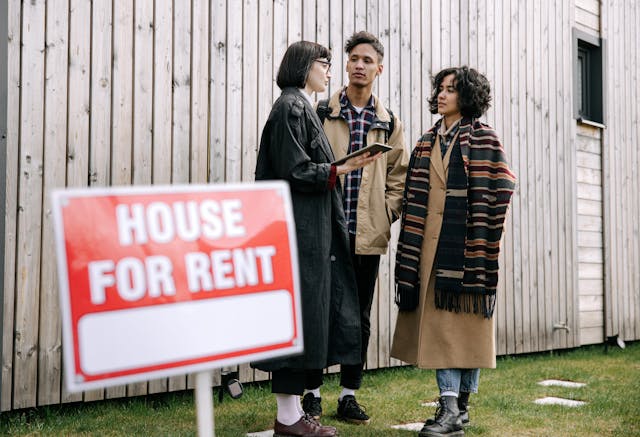_1.jpg)
Key Takeaways:
- Know the Fair Housing Act: Familiarizing yourself with the Fair Housing Act is crucial for every landlord. It covers everything from tenant screening to repairs and evictions, ensuring fair treatment for all.
- Protected Classes: The Act prohibits discrimination based on race, sex, religion, disability, and more. It’s important to treat all tenants equally and consistently in your policies.
- Avoid Violations: Violating the Fair Housing Act can lead to hefty fines. Always ensure your rental practices align with legal requirements to avoid potential penalties.
Before renting out your property in Virginia, it’s important that you first familiarize yourself with the Fair Housing Act. This can make all the difference in how successful you’ll be as a landlord.
Unlike other landlord-tenant laws, the Fair Housing Act applies in every facet of landlord-tenant interactions. Whether during the advertising and screening of prospective tenants, repair responses, and even tenant evictions.
As such, it’s important to familiarize yourself with it to ensure all your policies and rules are in alignment.
Now, violating the Fair Housing Act, either willingly or not, can have serious impacts not only on your bottom line but your standing as a landlord as well. Fees and penalties can be in the thousands of dollars even for first-time violators.
If looking to learn about all the important basics of the Fair Housing Act in Virginia, you’re in luck. We’ve created this guide at Key Home Sales & Management to walk you through everything to ensure you understand your legal responsibilities in this regard.
Federal Fair Housing Act
The Federal Fair Housing Act prohibits discrimination in all housing-related matters. Whether that is in renting, buying, or insuring homes.
The groundbreaking piece of legislation was passed on April 11, 1968, by President Lyndon B. Johnson. Congress enacted it to address widespread housing discrimination, which was commonplace at the time. Landlords could legally deny housing to certain groups based on race, color, sex, or nationality.

The act aimed to dismantle these discriminatory practices and promote integration among people of all races. While the Civil Rights Act of 1964 prohibited discrimination in areas like public accommodations and employment, it lacked strong provisions for housing.
The Federal Fair Housing Act was introduced to close that gap. Today, the act prohibits housing discrimination by housing providers based on seven protected classes: race, color, sex, nationality, familial status, disability, and religion.
Learn More About Partnering With Us
Fair Housing Act in Virginia
Just like the Federal Fair Housing Act, the Fair Housing Act in Virginia prohibits discrimination based on certain protected characteristics. These antidiscrimination laws apply in a variety of situations. Including, when trying to rent an apartment, obtain a mortgage, buy a house, or purchase homeowner’s insurance.
These requirements apply to a variety of housing providers in Virginia. Including, landlords, property managers, owners, real estate agents, savings institutions, banks, and mortgage lenders.
The Fair Housing Act in Virginia makes discrimination in housing illegal based on the following protected classes.
Race
Color
Nationality
Familial status
Religion
Sex
Disability
Source of funds
Sexual orientation
Military status
Gender identity
Sexual orientation
The act makes it illegal for landlords to apply one standard to one class of individuals and a different one to another class of individuals.

The following are examples of actions that would be deemed discriminatory in Virginia:
Denying an applicant the opportunity to rent your vacant unit because of their race or color.
Refusing to rent out your unit to a person because they practice Christianity or Islam.
Refusing to rent your vacant unit to someone because their nationality is Jewish, Asian, or African.
Only considering applicants of one gender and not the other. Housing discrimination based on sex is illegal not only in Virginia, but all the other 49 states as well.
Denying a housing opportunity to someone because they are age 55 or older.
Refusing to rent to someone because they have children. This would be discrimination based on familial status and is illegal as per the Virginia Fair Housing Act.
Denying individuals with disabilities housing opportunities. Whether a person has a mental or physical disability, shouldn’t form a basis for denying them a housing opportunity.
As long as someone’s source of funds is lawful, their source of income shouldn’t be the basis for denying them a housing opportunity.
Whether a person is homosexual, bisexual, or heterosexual, a landlord shouldn’t use their sexual orientation as a basis for qualification or disqualification.
Gender-related identity is also protected under the Fair Housing Act in Virginia. How a person identifies or appears, with or without regard to their birth-designated sex shouldn’t be a qualifying standard.
Someone’s military status shouldn’t be a basis for qualification or disqualification when it comes to housing opportunities.
The government agency that handles fair housing complaints is the state’s Fair Housing Board. This is the government agency that is tasked with administering and enforcing fair housing laws.

Fair Housing Laws Exemptions
Although limited, a few exemptions to the Fair Housing Act exist. The following are common exceptions:
Owner-occupied buildings that have four or fewer units. If the owner occupies one of the units as a primary residence, they may qualify for exemption status.
Schools and universities that are operated by religious organizations qualify for exemption under the FHA.
Single-family homes where the owner doesn’t own more than three such homes and manages the homes on their own may qualify for exemption.
Units rented to family members aren’t subject to fair housing laws. The family member, however, must be from the landlord’s immediate family.
Avoiding Fair Housing Law Violations
The following are some things you should do to keep legally compliant with the Fair Housing Act in Virginia:
Make sure you’re familiar with all fair housing laws, even those at the local level. Some cities may have additional protections.
Screen tenants while keeping in mind the protected characteristics. Ask the right questions, and use consistent screening criteria.
Provide disabled tenants with reasonable accommodations. For example, even with a strict no-pets policy, make sure to allow their service animals.
Have consistent policies for all tenants, especially when it comes to handling repairs or other issues.
Hire a property manager. This is the best way to ensure strict compliance with all the state’s landlord-tenant laws.
Bottom Line
Successful landlords in Virginia understand the importance of treating tenants fairly, equally, and respectfully—there’s no other way. It’s also essential to be well-versed in security deposit laws and the eviction process.
Managing a rental property is a breeze with Key Home Sales & Management. As the premier experts in Northern Virginia property management, we take care of every detail so you don’t have to. Reach out today and experience the best in the business!






